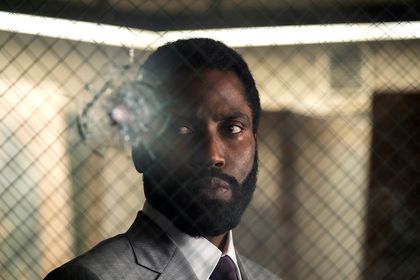‘Tenet’ is Nolan’s masterclass in making viewers get lost in a story
As the first major post-lockdown theatrical release, Tenet is not only the latest in Christopher Nolan’s long line of mind-bending projects but cinema’s first real attempt to draw viewers back into theatres across the world. Despite this pressure it manages to deliver. With an enticing plot and impressive visuals, Tenet is Nolan’s masterclass in making viewers get lost in a story, albeit annoyingly at points.
The film’s beginning sequence, although high octane, is initially very confusing. There’s so much going on that it feels as though you’ve started a film at the beginning of its second act. Within the first ten minutes prior to the title card, you have at least five very big questions. However, this may actually be the point. For the entire duration of the film, you never have all the answers. If you discover an answer, you’re then left with a new question.
The lack of information the viewer has coincides well with the lack of information the characters also have
The lack of information the viewer has coincides well with the lack of information the characters also have. Tenet is, in its purest form, a spy film. With espionage comes secrets and Nolan is keen to keep them that way. John David Washington’s character doesn’t receive a name throughout the entire film. He refers to himself as ‘The Protagonist’ a couple of times and, after a quick Google, I found that this is widely accepted to be the character’s nickname. Not knowing the main character’s real name further situates the viewer within the film as they too try to make sense of the many puzzle pieces.
One thing about Tenet that truly left me bewildered, was the attention to detail. The plot is ridiculously confusing. Initially, I was annoyed by this but, by the end of the movie, I was smugly impressed. Nolan gives the viewer every bit of information they need to grasp the time-bending concept that Tenet is based upon, but it is up to the viewer find the information on the screen. On my first viewing, I noticed things that the characters didn’t. I imagine on my second and third viewings, I would notice even more and be able to answer some of my remaining questions.
That’s what makes the film so fun. As I sat there, seeing my first theatrical film since February, Tenet reminded me that a good film should feel like no other film you’ve ever seen. Although a comparison could be made to Nolan’s similarly reality-distorting Inception, Tenet felt like nothing I had ever watched before. There were a couple of moments that were predictable, but for the most part I was constantly surprised by how events played out.
With the film being all about the perception of time, it was quite ironic that the pacing was off. There’s a major event later on in the film that feels like a natural yet unfinished close to the film, but the movie then continues for another half an hour. As excited as I was to be given another thirty minutes to try and make a bit more sense of what was going on, I also felt overwhelmed and exhausted by the amount of brain power I had exerted by that point.
If you decide to watch Tenet, go into it prepared for a challenge and with an open mind
If you decide to watch Tenet, go into it prepared for a challenge and with an open mind. Every ten minutes there’s a new enigma to wrap your head around and the film wastes no time waiting for you to catch up. Once you do manage to (mostly) work out what is going on, you feel gratified and also appreciative of the complexity. Give it a few years, and we’ll all look back on Tenet as fondly as we look back on Inception.
To hear more of what The Boar Film thinks about Tenet and all things Christopher Nolan, then check out Episode 13 of The Boar Film podcast about both here!

Comments